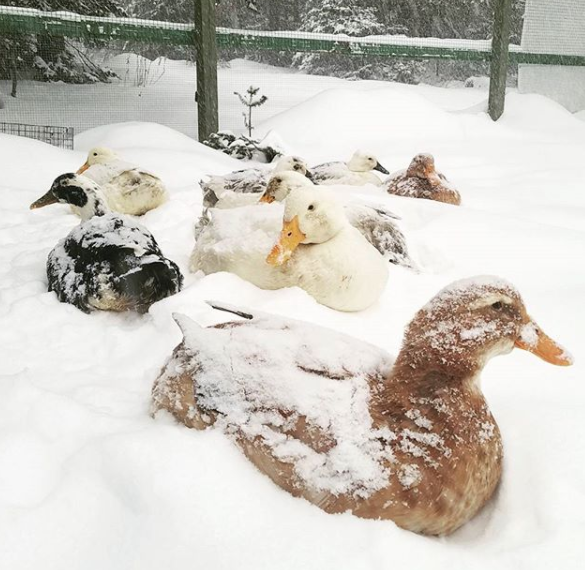12+ Top Tips for Keeping Ducks in the Winter
Ducks are extremely cold-hardy and actually need very little in order to make it through the cold weather just fine.
But there are several things you can do to help your ducks happier and healthier this winter.
12+ Top Tips for Keeping Ducks in the Winter
Unlike chickens who are generally comfortable at temperatures 45 degrees and above, ducks are just fine down to temperatures around 20 degrees F.
Below that however, they can suffer frostbite on their feet which could lead to amputation or lost limbs if they don't have a dry, draft-free place to hang out.
But as long as you have a secure structure for your ducks to sleep in and fill it with a nice thick layer of straw, and provide them a spot outside in the sun out of the wind during the day, your ducks should be just fine in temperatures well below zero.
However, there are a couple of extra things you can do for your ducks to help prevent the frostbite and make them comfortable in the freezing cold.
For Nighttime Winter Duck Care
- Before bedtime, high-fat, high-calorie treats such as cracked corn or peanuts help to put on a bit of extra weight for winter and keep the ducks warm overnight digesting it (peanuts are far more nutritious than corn)
- Be sure your duck house is well-ventilated. Ducks emit loads of moisture when they breathe and the moisture can lead to frostbite. Vents should be up high not at floor level.
- Add a thick layer of straw to the floor of your duck house and use bales of straw for 'insulation' along the inner walls if you live in the far North.
- Allow a minimum of two square feet per duck in the house. The smaller the house, the better able the ducks will be to create adequate body heat to keep the air above freezing.
- Ducks don't need water overnight in their house, they will just play in it and it will end up spilled and frozen on the floor, leading to wet bedding and a colder duck house. I only feed and water outside - year round.
- Ducks don't need heat or light in their house. It's a fire hazard and ducks generally lay pretty well through the winter with no added light.
For Daytime Winter Duck Care
- Lay down straw in the run/pen so the ducks can get up off the snow and icy ground. If you notice them hopping from one foot to another, or holding one foot up and only standing on one foot it's likely their feet are cold.
- Wooden planks, pallets, benches or even low stumps in their pen will also help the ducks get off the snowy, frozen ground.
- Ducks don't seem to mind the cold so much, but they don't like wind. Make a wind barrier in one corner of the pen with a tarp (as pictured above) or sheets of plywood and put down some straw on the ground for them - or make a wind shelter for the ducks to get out of the elements like the one pictured below.
- An a-frame shelter like this is perfect for summer too for the ducks to get out of the sun. Note: This shelter is NOT predator-proof and only for daytime shelter - not to be used as a night duck house.
- Ducks don't necessarily need to swim in a pool or pond during the winter, but they will enjoy a deep tub of water a few times a week on nice sunny days that they can dunk their bills and heads into and maybe even hop into for a quick bath, in addition to their regular water dishes. I choose a warm-ish day and use a deep, wide black rubber tub. I find that will stay unfrozen for awhile especially since they will be playing in it.
- They do need unfrozen water during the day available at all times to drink. I use a heated dog water bowl on days that are below freezing, which works quite well.
- Since weeds and grass are scarce during the winter, your ducks will enjoy cabbage, chard, kale or other cold crop leafy greens to munch on. A head of cabbage will also keep them busy for quite awhile and help prevent boredom!
How Ducks Keep their Feet Warm
A duck's body temperature is a toasty 104 degrees, while their feet, due to a unique vessel system, stay far cooler, very close to the ambient air temperature, right down to just about freezing when it gets extremely cold.
This helps the duck retain warmth in its body, reduce heat loss through the feet, and prevent its feet from succumbing to frostbite.
You might see your ducks standing on one foot. They'll pull the other foot up into the soft, warm down on their bellies to warm it up, then switch feet. Or they might plop down on the ground and pull both feet up.
However, prolonged contact with frozen ground or ice is not good for ducks. The will appreciate some straw on the frozen, snowy ground they can stand on.
Ours really seem to enjoy sitting in the snow, but you might notice that they pull their feet up off the ground and tuck them into their feathers and against their bodies for warmth.
Their waterproof feathers and thick layer of body fat keep them nice and warm.
Like any animal, your ducks will appreciate a bit of extra TLC come winter, and will be far happier and healthier if you take these few steps to ensure they stay warm on those frigid, blustery days.









.jpg)
























